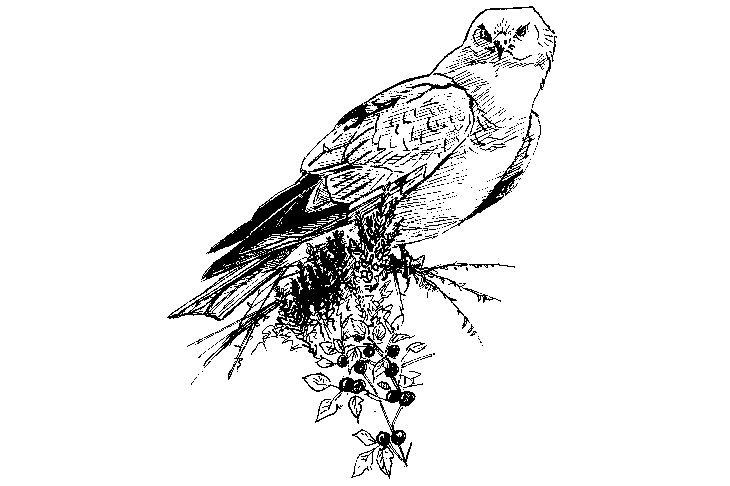I often feel slightly sorry for the British nature writer. It’s not an attractive emotion — it sounds patronising — but reading David Cobham’s Bowland Beth: The Story of an English Hen Harrier I felt it again strongly. Your nature writer now has a hungry market, keen and generous publishers and a shelf in the bookshop. But anyone younger than my parents — unless they are very fortunate — has seen only a fraction of the natural richness our islands once held. And despite the sales and acclaim and translation rights, none of them — of us — has even pushed the boundaries laid down by our predecessors in the last century, when British nature really was something to write home about. Think of ‘BB’ (Denys Watkins-Pitchford), Gerald Summers, T.H. White and Henry Williamson; and, later, Ian Niall (John Kincaid McNeillie) and J.A. Baker.
Yes, we now have Mark Cocker and Jim Perrin, and Helen Macdonald had a huge success with H is For Hawk (riding on T.H. White’s wings). But there has been no game-changing, law-altering masterpiece such as Tarka the Otter, and nothing as transporting or luminous as BB’s Wild Lone: The Story of a Pytchley Fox — a blend of fact and fiction which gets the reader as near as dammit to actually being a fox. Charles Foster’s marvellous Being a Beast was a striking effort, but he wrote as an outsider journeying into nature. BB, McNeillie and Summers wrote from the heart of it.
Bowland Beth takes Tarka the Otter as its model. Cobham wishes to see a revolution in moorland management and a change in the law in order better to protect hen harriers — beautiful and captivating predators which unfortunately for them eat grouse chicks. Cobham has form in this area: his film of Tarka did change attitudes and possibly the law regarding otters; and he writes well, with economy and clarity. In italicised sections in each chapter he tells the story from the point of view of Bowland Beth, who travels, like all harriers, but spends much time on Nidderdale, in North Yorkshire, which is sometimes well described.
It is a fine idea, and the two streams of narrative — voice-over from Cobham and colour, as it were, from the harrier — almost make an entrancing kind of written film. It is certainly a good read, terrific in places, informative, engrossing and moving, with a vital message about conservation and the iniquities of certain rich men who own moors, and I strongly commend it.
Another editor might have ensured that Cobham’s hawk did not think in clichés, though. The sun is blood-red. The eyes of an eagle-owl are blood-red. A male harrier decides ramblers are ‘too close for comfort’. A red wing is as ‘thin as a rake’. It keeps happening and it is distracting: the nature writers of the past did things differently. It is not anthropomorphic to have a bird feel amazement, and perhaps blood is their standard red. But it’s an unfortunate imposition of mundane human thought-patterns.
Cobham is a superb film editor. The cuts between narration, wider points of interest and the often thrilling life of the harrier are perfectly done. Thanks to satellite tracking and developments in ornithology we know more about the lives and adventures of Beth and her ilk than perhaps anyone ever has — except the obsessive peregrine follower J.A. Baker. And she makes a fabulous heroine. Stephen Murphy, the harrier researcher and guardian to whom the book is dedicated, describes her as
one of those birds that you come across now and then that are absolutely perfect — her plumage a rich glossy chocolate brown, the most wonderful eyes, yellow irises and vivid chrome-yellow legs with formidable black talons. She’s what I call a ‘super’ hen harrier.
Double shame, then, on the keeper who shoots her at the end, and the landowner who has paid him to do it. You could work out the identity of the various land owners who permit or encourage the illegal killing of raptors, but they are not named. I would have gone for it. Oddly, Cobham makes a start on tracking down a moor-owner whose destruction of habitat may have contributed to the devastating floods which hit Hebden Bridge and the Calder valley two years ago, getting as far as talking to an activist who rings the bookshop in Hebden Bridge, ‘only to be told that their answer phone was full and they weren’t accepting any more calls’. Hebden is stuffed with journalists and writers. It would not have been hard to find one of us.
Never mind. This is still in many ways an outstanding book, and the law surely must change (or be fiercely enforced). In the bookshop in Hebden it will stand alongside a rank of inferior volumes which are basically memoirs prettied up with ‘nature writing’. I have been kind about examples in the past, but will be no longer. Bowland Beth reminds us that nature deserves to be written about with passion, power and poetry. Writers and readers have a role in protecting the country. It is time we performed it better.






Comments